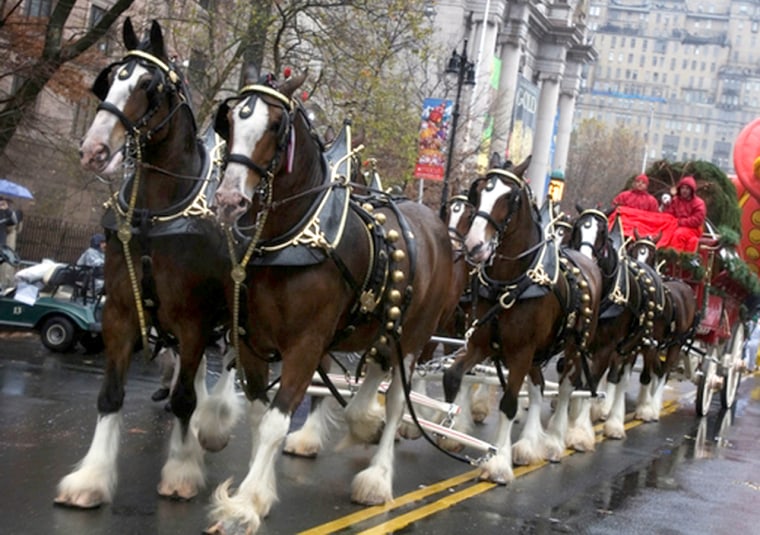It’s been a tough week for American icons. First news broke that New York's Chrysler Building may be sold to an Abu Dhabi investment fund. Now America's most storied beer company may be taken over by a conglomerate based in a country best known for its love of waffles.
It is hard to believe that Anheuser-Busch of St. Louis, created in the 19th century and still run by a descendant of the founding family, August Busch IV, could be owned by a Belgian brewer, but that looks increasingly likely. The unwanted takeover offer from Belgium-based InBev, first rumored in May, became official Wednesday with a $46.4 billion bid that would rank as the third-largest foreign acquisition ever of a U.S. company, according to The Wall Street Journal.
The deal is by no means a sure thing. Anheuser-Busch officials reportedly have begun discussions with Mexican brewer Grupo Modelo about a transaction that could thwart the Belgian takeover offer. Budweiser's parent company already owns half of Grupo Modelo.
If the InBev deal is completed, Anheuser-Busch would become part of a behemoth that will be “the world’s biggest brewer by volume,” as Bloomberg notes. But the impressive title would come at a price. Budweiser — already the No. 1 selling beer in the world, followed by its offspring, Bud Light — would surely see cuts in everything from employees to its massive marketing budget.
Beer and sports have always gone hand in hand, and so the deal could have a huge impact on the athletic front if the Anheuser-Busch board approves this deal. “Welcome to InBev Stadium” may really be a turn-off to hardcore St. Louis Cardinals fans who have enjoyed decades worth of two Busch Stadiums.
Baseball announcer Harry Caray, who broadcast Cardinals’ games for 22 years, was known later as "a Cubs fan and a Bud Man." Being called “a Cubs fan and a Stella Artois man” doesn’t have quite the same ring. Will the Budweiser frogs of Super Bowl lore all of a sudden croak in a new language?
Speaking of the Super Bowl, Anheuser-Busch holds a relationship dating back 20 years to serve as the exclusive alcoholic beverage sponsor of the telecast, and the company usually buys up to five minutes of advertising time for America’s biggest game (2009 projected cost: close to $30 million). Its commercials — from ax-wielding hitchhikers to a zebra who watches instant replays of Clydesdale moves — have been among the most memorable.
To think that InBev’s Quilmes Cristal beer brand could be touted during the sports religious holiday of Super Bowl Sunday is almost as bizarre as, say, Budweiser serving as the exclusive beer in Germany’s World Cup stadiums in 2006 (believe it or not, it was).
And what about the beloved Clydesdales? These 2,000-pound horses have become an American institution. It’s tough to imagine they could be used to promote a beer called Leffe. Anheuser-Busch also owns theme parks including Busch Gardens to Sea World. Reports say these would likely be sold off if InBev’s purchase goes through.
Since the marriage of Molson and Coors marriage in 2005, it has been tougher for Budweiser to compete. And InBev’s rise has been impressive over the years. No doubt a combined company could move quickly into relatively untapped markets, such as China.
Also, a $65-per-share offer is generous, given Anheuser-Busch's sluggish stock price over the years. Anheuser-Busch shares were trading at about $57 before rumors of a possible deal were first published late last month.
But still: Budweiser is truly an American beer. International sales aren’t even 20 percent of its revenue. Who will care about the American lager in a company dominated by Flemish brews? Does anyone at InBev know about the Beechwood aging process and the fact that Beechwood chips are cooked and tasted before being used? Will the barley that is now only collected from North American prairies be discarded for a cheaper version? For Anheuser-Busch, is losing its independence worth the price?
There was an outcry when the Pebble Beach golf course fell into Japanese hands about 20 years ago, but its high-priced green fees meant only a select few could access it anyway. By contrast, a can of Budweiser is available to all — at ballgames, picnics, grocery stores, bars and keg parties — for a small price. Just as Volkswagen was the people’s car, Budweiser is the people’s beer. But when a brewery falls into new hands, there is no telling the changes that may occur in terms of distribution, production — even in the recipe of the product.
In a famous commercial from the 1970s, the Clydesdales ride through Anheuser-Busch gates to the voice of a throaty female singer warbling “Budweiser beer, the king is second to none!” That won’t be true if the unsolicited offer is OK’d. In the new company, the king will definitely be playing second fiddle.
